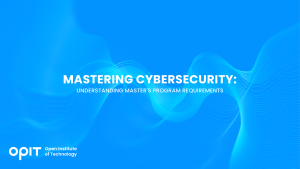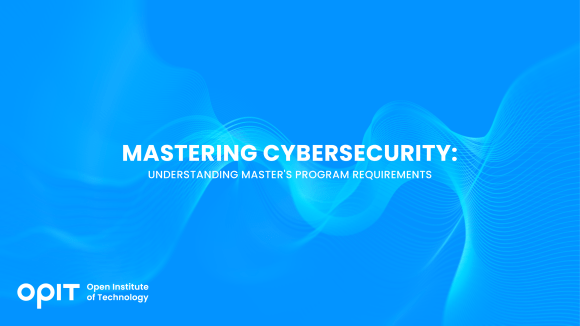

Businesses are under increasing threat from cybercriminals and malicious cyber attacks, a threat that is growing year on year. In 2023, malicious attacks cost U.S. businesses $8 trillion, and those losses are expected to climb to $9.5 trillion in 2024, a steady increase that shows no sign of slowing.
Given this state of affairs, it is no surprise to learn that professionals with a master’s in cybersecurity are in increasing demand. However, choosing the best cybersecurity master’s degree can be a daunting task. There are an increasing number of educational institutions that provide this qualification (or others like it).
However, those wishing to take their qualifications to a new level should be aware of the cybersecurity master’s requirements.
Most institutions will need the prospective student to have previous qualifications, such as a bachelor’s degree or relevant work experience. These requirements differ for each educational institution, and understanding them is key to choosing the right master’s degree in cybersecurity.
General Requirements for Cybersecurity Master’s Programs
Although the requirements to gain admission to a master’s in cybersecurity program vary by educational institution, there are some common prerequisites. These can include:
Prior Education
As mentioned, a recognized bachelor’s degree in cybersecurity is considered an essential stepping stone towards a master’s qualification. However, this is not an absolute. Many educational institutions will evaluate prospective students on a case-by-case basis, and degrees in other fields can count in the applicant’s favor. As a general rule, the student should be able to demonstrate knowledge in areas such as computer science, information technology, or a related field.
GPA Requirements
As a rule of thumb, entry into most master’s programs will require a GPA between 2.5 and 3.0. However, there are exceptions, with some schools requiring much higher grade point averages.
Program Prerequisites
Many educational institutions have stringent requirements on undergraduate courses that they require for the student for admittance to the master’s program. Knowledge of data structures, programming languages, calculus, programming, networks, and systems security concepts will definitely be advantageous.
Letters of Recommendation
Admission can also be influenced by work experience demonstrating a knowledge of softer business skills. These include communication, teamwork, mentoring, and even ethical standards. Many schools will accept letters of recommendation from business leaders, as well as a variety of other testimonials. These will certainly increase the chances of acceptance into the master’s program of your choice, irrespective of other cybersecurity master’s requirements.
Specific Skills and Experience
The importance of prior experience in the fields of IT and cybersecurity when applying for entry to a master’s degree in cybersecurity cannot be overstated. A good track record in real-world implementation is valuable, as is participation in research projects.
Paid internships can be extremely valuable when it comes to admission to the degree of your choice. These internships are also important in demonstrating a commitment to lifelong learning and can contribute to credits toward a master’s qualification.
OPIT’s Cybersecurity Master’s Program Requirements
The OPIT Master’s Degree (MSc) in Enterprise Cybersecurity has several core requirements for admission. These include prior technical experience or proven expertise. However, this requirement does not bar those who lack experience from admission. Applicants who do not have a technical background in the cybersecurity field will undergo an assessment to gauge their foundational IT and cybersecurity skills.
A passion for cybersecurity innovation in an ever-evolving threat environment is as important as prior experience when it comes to gaining entry to the OPIT master’s course. Candidates who demonstrate a commitment to continuous learning will not be hamstrung by a lack of previous working experience when it comes to gaining acceptance into the OPIT postgraduate program.
Preparing for OPIT’s Cybersecurity Master’s
Those wishing to enroll in the OPIT cybersecurity master’s program can ensure that they are prepared for any potential assessment (and the demands of the coursework) in a variety of ways.
Online courses offer a flexible, affordable, and accessible way to gain insights into the cybersecurity environment, and chat groups can provide real-world interactions that can fill any knowledge gaps. Taking part in group chats may also provide mentoring for the aspirant cybersecurity expert.
As part of a commitment to lifelong learning, staying up to date with the latest trends and developments in the cybersecurity field is essential. Subscribe to relevant newsletters and set your news alerts to flag stories about cyber threats and cybersecurity.
Why Choose OPIT for Your Cybersecurity Education?
OPIT provides a fully accredited Master’s Degree (MSc) in Enterprise Cybersecurity that emphasizes integrating theory and practical application in real-world solutions.
The affordable OPIT master’s program boasts a curriculum developed in close consultation with industry leaders and is presented by leaders in the field of cybersecurity. The program is designed to meet and exceed the requirements of some of the industry’s most innovative organizations.
The study experience is streamlined through an advanced online learning environment that is perfect for those who want to take their careers to the next level while enjoying the flexibility to set their own pace when it comes to coursework.
For professionals who want flexibility and demand only the best qualifications, this master’s degree is ideal. An OPIT master’s in cybersecurity is the key to preparing students for leadership roles in the cybersecurity sector.
A Master’s in Cybersecurity – Final Considerations
Research is the key to both successful enrolment and eventual graduation from a master’s degree in cybersecurity.
Students should be aware of cybersecurity master’s requirements before they make a final decision on a degree provider. These requirements will often include a bachelor’s degree or work experience. But soft skills also count when applications are evaluated.
By choosing an OPIT Master’s in Enterprise Cybersecurity any prospective student will enjoy peace of mind. That sense of confidence comes from knowing that the degree they have selected is respected by leading organizations in the cybersecurity field.
Have questions?
Visit our FAQ page or get in touch with us!
Write us at +39 335 576 0263
Get in touch at hello@opit.com
Talk to one of our Study Advisors
We are international
We can speak in:




